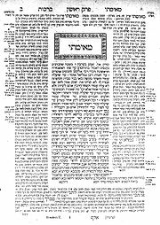
Talmud
The Talmud is considered an authoritative record of rabbinic discussions on Jewish law, Jewish ethics, customs, legends and stories. It consists of the Mishnah, a record of oral traditions, and the Gemara, which comments upon, interprets and applies these oral traditions. A section of the Mishnah is followed by the Gemara on that section. There are two distinct Gemaras: the Yerushalmi and the Bavli, and two corresponding Talmuds: Talmud Yerushalmi (Jerusalem Talmud) and the Talmud Bavli (Babylonian Talmud); The word "Talmud", when used without qualification, usually refers to the Babylonian Talmud. Neither Gemara is complete.
See also: Pirkei Avot, a section of the Mishnah.
- Babylonian Talmud, Sanhedrin 4:8 (37a)
- Rabbi Hillel (Avot 1:14)
See also: Pirkei Avot, a section of the Mishnah.
Sourced
- Whoever destroys a soul, it is considered as if he destroyed an entire world. And whoever saves a life, it is considered as if he saved an entire world.
- Babylonian Talmud, Sanhedrin 4:8 (37a)
- If I am not for myself, then who will be for me? And if I am only for myself, then what am I? And if not now, when?
- Rabbi Hillel (Avot 1:14)
- Repent one day before your death. (Avot 2:10)
- Say little and do much. (Avot 1:15)
- Make a teacher for yourself, acquire for yourself a friend, and judge every man to the side of merit. (Avot 1:6)
- In a place where there are no men, strive to be a man. (Avot 2:5)
- Let your home be a meeting place for the wise; dust yourself in the soil of their feet, and drink thirstily of their words. (Avot 1:4)
- Make that His will should be your will, so that He should make your will to be as His will. Nullify your will before His will, so that He should nullify the will of others before your will. (Avot 2:4)
- Rabbi Eliezer would say: The honor of your fellow should be as precious to you as your own, and do not be easy to anger. (Avot 2:7)
- Rabbi Joshua would say: An evil eye, the evil inclination, and the hatred of one's fellows, drive a person from the world. (Avot 2:11)
- Rabbi Tarfon would say: The day is short, the work is much, the workers are lazy, the reward is great, and the Master is pressing. He would also say: It is not incumbent upon you to finish the task, but neither are you free to absolve yourself from it. (Avot 2:15-16)
- He [Hillel] would also say: One who increases flesh, increases worms; one who increases possessions, increases worry; one who increases wives, increases witchcraft; one who increases maidservants, increases promiscuity; one who increases man-servants, increases thievery; one who increases Torah, increases life; one who increases study, increases wisdom; one who increases counsel, increases understanding; one who increases charity, increases peace. One who acquires a good name, acquired it for himself; one who acquires the words of Torah, has acquired life in the World to Come. (Avot 2:7)
